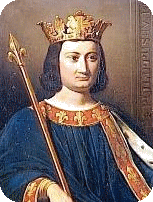Philippe IV Le Bel
 |
 |
 |
Philippe IV le Bel one was born in Fontainebleau the 1268, wire and successor of the king Philippe III the Bold one.
By its marriage, in 1284, with Jeanne de Navarre, Philippe acquired Champagne and Navarre.
It reached the throne on October 5 1285, at the seventeen years age. To control, it was surrounded " legists ", specialists in the Roman law and burning defenders of the royal authority; most known are Pierre Flote, Guillaume de Nogaret and Enguerrand de Marigny. Extremely of their support, the king continued the monarchical centralization which Louis IX had started.
Confronted with ceaseless difficulties of money, Philippe le Bel one tried to establish a direct imposition and, having failed in this company, had recourse to various easy ways. He confiscated in particular the goods of the merchants lombards and the Jews, before making them stop then expelling (first in 1277, 1291 and 1311, seconds in 1306). With the assistance of its advisers, it carried out various monetary deteriorations; those, by striking the small people heavily, caused riots, which were repressed hard.
In 1307, Philippe launches a new scathing attack by ordering the arrest, with the contempt of the prerogatives of the pope, the monk-soldiers of the Temple.
All heads of the command, whose large Master Jacques de Molay, were stopped and given to the pope Clément V (1308) who, under the pressure of Philippe le Bel one, condemned a certain number of them to roughing-hew (1310) and removed the command (1312). In 1314, Philippe le Bel one made perish like deviationist the last dignitaries.
Philippe had many contentions with papacy (1296). The conflict took truly fine only into 1305, when Philippe le Bel one imposed a French on the head of the Church, Clément V, who declared it innocent events of Agnani and cancelled all the decisions that had taken Boniface VIII in its opposition. Completing to fix papacy with the monarchical supervision, Philippe le Bel one decided his installation in Avignon (1309). This measurement, desired on a purely provisional basis, was to be prolonged until 1377.
First of the modern sovereigns, Philippe le Bel one held head with the temporal power of the Church and has feudality, increased the royal field and supported the development of the administrative and legal institutions. It increased the importance of the chancellery and the hotel of the king and specified the role of the Parliaments.
Philippe le Bel one died on November 29 1314 in Fontainebleau, following an accident of hunting. Its body rests in the crypt of the basilica of Saint-Denis, close to the tomb of its grandfather Louis IX. His three sons, Louis X Hutin, Philippe V Length and Charles IV the Beautiful one controlled successively after him.

